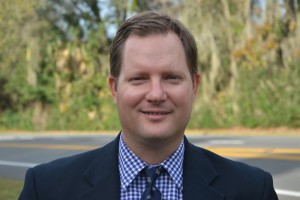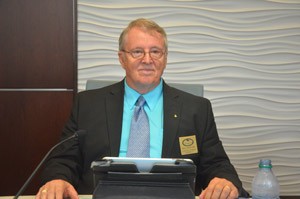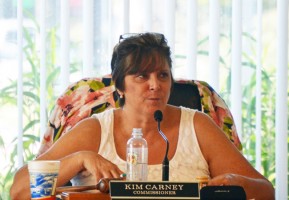
Two years ago the Tourist Development Council, the arm of county government that oversees spending of the county’s tourism tax revenue ($1.6 million last year), significantly changed how much of that money is spent. It adopted a “discretionary fund” policy that shifted significant sums to a fund designed to recruit special events to the county: $165,000 last year, $215,000 this year.
The fund is much less strictly regulated that other pots, leaving its allocations mostly to the discretion of Tourism Director Matt Dunn, with pro forma approval by the Tourist Development Council followed by an equally rubbery stamp from the county commission. Council members, a majority of whom are private sector representatives of the tourism industry such as hotel or tourist attraction executives whose businesses can benefit from TDC allocations, directly or indirectly, seldom ask probing questions or halt Dunn’s proposals: it was the TDC that had unquestioningly endorsed Dunn’s ill-fated proposal last year to use the Princess Place Preserve for an extreme sport event—until a public outcry and the County Commission, which must ratify all TYDC recommendations, forced Dunn to abandon the proposal, at least at the preserve.
But it did not stop him or the same commission from awarding a $25,000 taxpayer subsidy for the Spartan race organizers, even though the Spartan organization is a private, for-profit company, even though it will be holding its race on private land, and even though it will not have to give county government or the TDC any detailed accounting on how it spent its subsidy, or proof that the event generated more tax revenue that it took in. The same approach applies to the $40,000 subsidy for a “writers’ conference” at the Hammock Beach Resort, $27,200 for the Florida Sports Foundation’s annual meeting in May, also at Hammock Beach, or $22,500 for a beach volleyball event, again at Hammock Beach. (Tim Digby, the general manager at the Hammock Beach Resort, is a member of the TDC.)
That’s what the discretionary fund allows: big money awards to private companies with limited accounts required in return.
In comparison, the TDC requires much more rigorous accounting for much smaller dollar awards to much smaller companies holding more modest events, down to requiring proof that the events filled a specific number of hotel rooms. Absent such proof, the subsidies, which have a $10,000 ceiling, are not awarded.

Dunn presented the changes with a one-page outline that was more brief and shorn of analysis than even the one or two-page memos that the county administration submits to the county commission for every action item on its agenda. And those memos are explanatory cover sheets or summaries for what usually amounts to many more pages of background materials that detail every proposal.
Dunn, who likes to make deals but doesn’t like the paperwork that goes with it, on two occasions spoke derisively of “pushing paper” to explain why some of the changes would be beneficial, as they would reduce paperwork and, in one case, increase his authority to reject applicants before they even get to the TDC.
Reducing the paper trail while putting more emphasis on “discretionary” spending.
“We are funding events that don’t necessarily have a tourism implication to them,” he told the council. “Staff when it comes to the grant program, excuse the expression, but we’re paper pushers, we don’t make these decisions, the council makes these decisions and the county commission makes these decisions, so if you’d like us to have more flexibility in grading these, whether or not they should come before you, that’s an item for discussion as well.”
Dunn was mischaracterizing the process somewhat (as he would for much of the segment’s proposals, referring to many of the changes as mere “clean-up” items rather than substantive policy shifts).
Of course the staff doesn’t make the decisions: that’s not how the government process works. County Administrator Craig Coffey, who sat behind Dunn for much of the meeting and interjected several times—a reflection of the importance he placed on the meeting’s outcome—doesn’t make spending decisions, either: it’s always up to the voting body to accept, ratify or reject such matters, leaving it to its administration to present proposals as fully developed as possible, and leaving the administration free to make recommendations. Dunn claimed he couldn’t even do that much, which was not the case: the council never stopped its tourism chief from presenting—even pushing—proposals, advocating for them (or not), and Dunn does so routinely to back up his big (proposed) awards of discretionary dollars.
What he was asking for, however, was authority to decide on applications before they even get to the council. (A minor grant award to Bunnell for its Christmas event last December had been rejected by the council but reinstated by the county commission. Dunn had been miffed by the commission’s reversal, and referred during the meeting to it last week, as if it were still smarting.)
The council, remarkably, gave him that authority.
“Any applicant that feels that they do have a proper event but staff has declined to do it, they would have an appeal ability to come before us in any case,” Revels said.
That was only one of Dunn’s string of victories. He is planning to go further. “One possibility would be that we would remove all athletic events, all sports tourism related events from the grant program altogether and have those funded through the discretionary fund,” Dunn said, presenting the idea (and couching it as being merely at the discussion stage at this point) as a benefit to the smaller grants. What he did not say is that all those sports events would, as with other discretionary awards, then be funded with little accountability: whether those events fill local hotels or not would be irrelevant. They’d just be subsidized, with no clear, documented proof that the events actually generate “room nights” or promote the county.
Several members of the tourism council raised questions and cautions about the changes, including Barbara Revels, who chairs the council (and chairs the county commission), Bill McGuire, who represents Palm Coast, Tom Grimes, the general manager of the Hilton Garden Inn in Palm Coast, and Michelle Brown, who owns a gift shop in Flagler Beach. But in the end, and after hurrying through what amounted to major changes to TDC policy—Revels several times pushed the discussion along, fearing a loss of quorum—all but one member of the council (Grimes) voted in favor of the changes.

But a TDC recommendation gives the county commission cover to say just that” that its council has already endorsed the proposal.
“Sometimes I wonder if perhaps a big subject like this, if a workshop would have been something that would have been more appropriate,” Grimes said, “so that people can talk about things and think about things, and then bring it back, come back and vote on it from that point, because by then you know all of the information, you’ve had a chance to think it through and come up with a decision.”
Coffey in a subsequent interview said that he considered the TDC meeting similar to a workshop, and that, at any rate, an April workshop will be scheduled with the county commission to go over the changes. But he also agreed with the notion of redefining how TDC money is spent so that it focuses exclusively on events that increase the county’s tourism draw. Community events don’t necessarily do that, he said, especially not the way bigger events drawn with discretionary money have done. “To be successful I think Matt has tapped an area that frankly we weren’t tapping,” Coffey said.
Last year the budget for community event grants (the “quality of life” sort, a name Dunn also dismissed as inadequate) was a paltry $15,000 (even less than the $25,000 Palm Coast government spends on community arts). The council spends that much on a one-time award for fireworks for Palm Coast events, and $20,000 for fireworks in Flagler Beach. It does so without requiring proof of overnight stays. Grants that generate overnight stays in hotels totaled just $85,000. Both that sum and the quality of life grants’ total were increased some, and may total around $120,000 next year, though the amount would still be dwarfed by the discretionary fund.

Carney questioned the return on investment of some of the council’s other, bigger grants and ended: “You are squelching any hope for any small event in Flagler County.”
“I do want to say that I have some of the same concern,” Revels said just before the vote. She defended reversing the TDC’s decision on the Bunnell Christmas event. “I think it’s great when we have small community events, particularly when they’re put on by organizations that do nothing but improve the community and help the community. Is that related to TDC dollars, is that related to tourism dollars? Probably not, but there are people staying here, it does create a more well-rounded community, so it’s a tough question as to which way to go on some of this. It would be hopeful that maybe some of these organizations would be able to grow their events such that they would stand alone in the future and still be able to have them. But I don’t know how to change that to make it different.”
Kurt Allen, a TDC member and the general manager at Marineland Dolphin Adventure, approved of the changes wholeheartedly.
“The TDC money that we are granting out is to promote tourism, and if organizations do not want to provide back-up to show us how they are promoting tourism, and they are community events, then the community in my opinion should be the one supporting it,” Allen said. “Tourist dollars should be here to support tourism marketing, to bring more people into the county. And I think there is a very fine line on a community event versus a tourism related event, and that there needs to be back-up, there needs to be something, because we are the ones to push it forward to BOCC [the Board of County Commissioners], that says these dollars are being spent on tourism related items, and we’re not here to not help the community. We are. And by bringing more tourists to the community, the sales tax revenue collected, the real estate that gets sold, all the other benefits that happen by people visiting our county, helps the community. We’re kind of the top of that, to bring the people here. Everything else is going to flow from that. To help an event that has no tourism related activity to it, per se, that I don’t think is spending our money wisely, and I think we are here on this board to make that determination.”
![]()
Click to access Dunn-tdc-presentation.pdf





























Mark says
Not a problem. It’s just taxpayer money Spread it around to your buddies.
Seat Belts for Bicycles says
1/4 of a MILLION dollars of OUR taxes going for drawing “SPANDEX” people and other road hazards to Flagler. Gee, maybe a Beer Drinking, Bicycle Race up and down A1A on a Saturday night would be a great idea !!!!!
YankeeExPat says
“Beer Drinking, Bicycle Race”
Careful Dude, there just might well be a copyright on that one.
confidential says
Seat Belts…you only want our roads for roaring engines and speeders? Real road hazards are all these maniacs at the steering wheels not respecting pedestrians, bicyclist, motorcyclist, joggers, or wildlife.
The Spandex people as you call them sure look and are in better health than you are, maybe a couch potato..? So keep your distance from them as they have the privilege to use our roads as you have.
Charlie D says
Why don’t we just give Dunn the county check book. This has got to be one of the dumbest things our county reps have ever done.
tulip says
Another “shady” deal that benefits certain people in the county. We need to elect new, honest people that will question and investigate these kinds of deals and look into who benefits the most. Don’t just sit there and vote “yes”. They should be making decisions based on what’s good for the county and not for themselves. Also the BOCC should make Coffey realize that he works for the commissioners, NOT the other way around. It appears that Mike Dunn has the BOCC in his pocket.
Now the TDC won’t have to account less for their actions and spending? The BOCC will have to approve it? That’s a joke, it’s always “yes”. They should making sure all the money TDC collects goes for tourism and benefits all of Flagler county, not somebody’s business or personal gain.
There are 3 commissioner seats up for election and the primary is in August. Puleeze, no realtor or real estate involved people. We have enough of those. How about ordinary business or financial people that don’t “owe” anybody anything and will see issues in a different and fresh way.
confidential says
Yes Tulip: like Navy Veteran Jason France running against Revels. A young family man with deep roots and service to our country.
Candidate for County Commissioner District 3 in Flagler Beach.
University of North Florida – College of Business Administration
scoff the cuff says
Another article of reasons to ‘Fire them (sic) that hire them.’
My View says
The three county commission seats up in August and November 2016 need to be filled with some new blood, by three individuals who will send Cofffey, Dunn, Hadeed, Mayer and others packing. We have had enough of blood sucking ticks around here. The board of county commission for years has just let Craig Coffey do what he wants and people are regularly being fired or forced out around here to bring in their buddies and coheres. I agree with Confidential, Jason France would be an excellent choice to replace Barbara Revels. I met Jason France this past weekend at the European Village and am quite impressed.
Wishful Thinking says
Revolting waste of people’s hard earned money… ‘Bed Tax’ is nothing but ‘graft tax’…